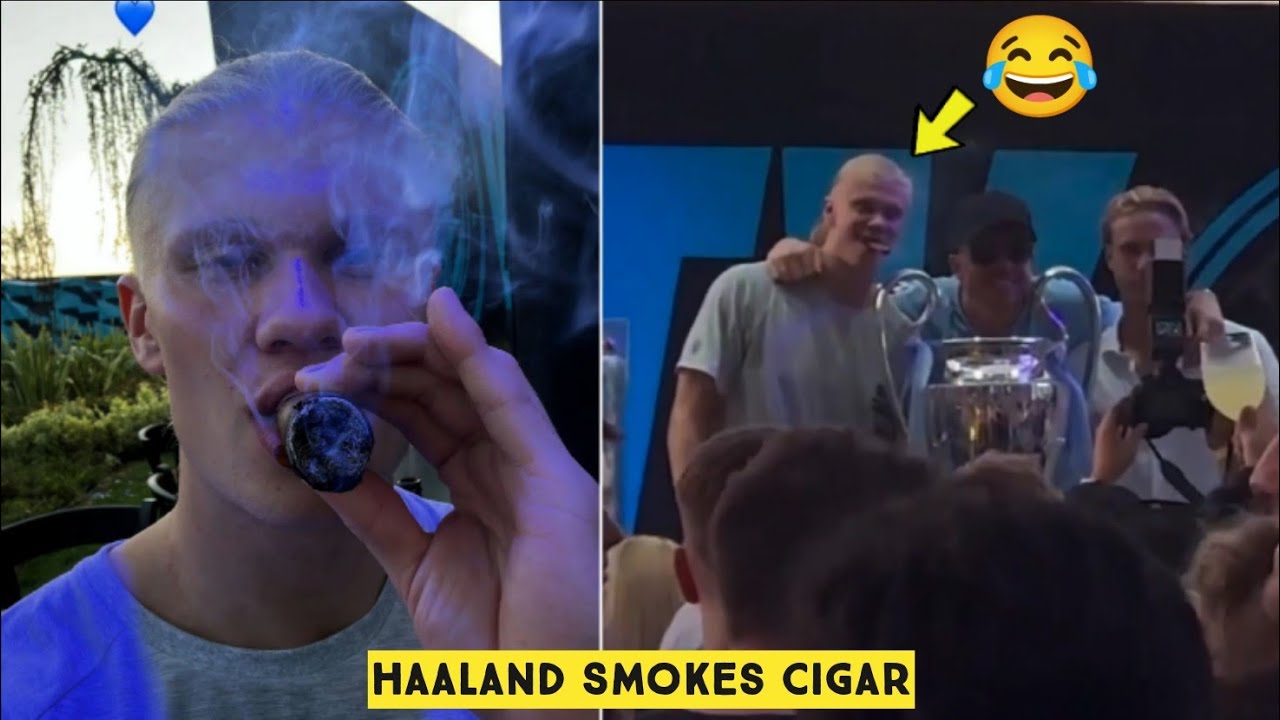
Norwegian football sensation Erling Haaland has taken the world by storm with his incredible skills and goalscoring prowess. However, beyond his on-field achievements, online chatter has focused on a different question: does Erling Haaland vape? Rumors and speculation have spread, leaving fans and the public curious about the athlete’s personal habits.
This article aims to separate fact from fiction. We’ll examine the limited evidence surrounding the “Does Erling Haaland vape” question, explore the broader issue of vaping in sports, and discuss the importance of responsible reporting when it comes to public figures.
Does Erling Haaland Vape? As of today, there’s no credible evidence to confirm that Erling Haaland vapes. It’s important to prioritize factual information and avoid spreading unverified rumors.
Let’s unpack this controversial topic.
The Haaland Case: What We Know (and Don’t Know)
The rumors about Erling Haaland and vaping seem to have originated from social media platforms, particularly TikTok, where short videos allegedly showed him with a vape-like device. These posts quickly went viral, sparking discussion and debate across fan forums and news aggregators.
Despite the buzz, it is crucial to emphasize that there is no verified evidence to confirm that Erling Haaland vapes. No credible news sources or official statements from Haaland himself or his team support these claims.
How Rumors Spread and Impact Perception
In the age of social media, unverified information can spread like wildfire. The desire for juicy gossip, especially when it involves high-profile figures, can lead people to share and amplify speculation without critical evaluation.
Even if a rumor is baseless, the mere repetition can create a perception in the public mind. This can potentially damage a person’s reputation, regardless of whether the claims are true. In Haaland’s case, it unfortunately distracts from discussions about his incredible athletic achievements.
Vaping in Sports: Trends and Concerns
While obtaining concrete statistics on vaping within specific sports can be difficult, studies suggest its use is on the rise among athletes. This trend mirrors the increase of vaping in the general population, especially among younger individuals.
Potential Health Risks for Athletes
Vaping is not without health concerns, particularly for athletes who rely on optimal lung capacity and cardiovascular health. Some key risks include:
- Respiratory Issues: Vaping can irritate the lungs, leading to shortness of breath, coughing, and an increased risk of lung infections – all potentially detrimental for athletic performance.
- Cardiovascular Strain: Nicotine, common in many e-liquids, constricts blood vessels and increases heart rate, putting extra stress on the cardiovascular system during intense exercise.
- Unknown Long-term Effects: While vaping may seem like a “safer” alternative to smoking, research is ongoing regarding the long-term health risks, especially for athletes who might use vaping products over extended periods.
Regulatory Stances
Awareness of vaping’s potential harms is leading some sports leagues and organizations to take action.
- Some organizations have banned vaping in stadiums or during competition.
- Others implement educational campaigns aimed at informing athletes of the risks.
Key Takeaway: It’s important for athletes, coaches, and sports organizations to be aware of the potential health risks of vaping. Prioritizing athlete well-being means addressing these concerns through informed choices, education, and potentially stricter regulations.
The Ethics of Speculation
The question of whether Erling Haaland vapes brings up the broader ethical dilemma of speculation in media. Media outlets hold a responsibility to report the news accurately, especially when it concerns the personal lives of public figures. Spreading unverified rumors can have serious consequences.
- Damage to Reputation: Even if a rumor is later proven false, the initial speculation can tarnish a person’s reputation. For athletes, this could negatively affect their performance, sponsorship deals, and public perception.
- Misleading the Public: Unfounded rumors perpetuate misinformation and distract from more relevant discussions. In this case, focusing on speculation about Haaland’s personal choices could overshadow his phenomenal athletic achievements.
- Erosion of Trust: When media outlets engage in sensationalism, it erodes public trust in news reporting. It’s crucial to maintain journalistic integrity and uphold ethical standards.
How Can Readers Be More Critical?
- Scrutinize Sources: Consider the source of the information. Is it a reputable news outlet or a social media account spreading gossip? Look for credible sources that back up claims with evidence.
- Watch Out for Bias: Notice any language or tone that suggests a particular bias or agenda. Objectivity is key in responsible reporting.
- Seek Multiple Perspectives: Don’t rely on a single source. See if other news outlets are reporting the same information or offering different angles.
A Call for Responsible Reporting
In the age of social media and rapid news cycles, it’s tempting to rush with juicy stories. Yet, the commitment to truth and accuracy should always take precedence. The focus should remain on Erling Haaland’s undeniable talent on the field, rather than unconfirmed rumors about his personal life.
Beyond the Rumor: Key Takeaways
While social media buzz and online speculation can be captivating, it’s crucial to remember these key points:
- Evidence Matters: Currently, there’s no verifiable evidence that Erling Haaland vapes. Spreading unconfirmed rumors can unjustly harm a person’s reputation.
- Focus on the Field: Haaland’s extraordinary talent and athletic achievements deserve our primary focus. Let’s celebrate his on-field performance rather than dwelling on unsubstantiated personal life details.
- Health Comes First: Whether it’s Haaland or any other athlete, prioritizing credible health information over gossip is essential. Let’s emphasize healthy choices and understand the potential risks associated with habits like vaping.
By shifting the conversation towards evidence-based facts, respect for athletes, and reliable health information, we can move beyond mere speculation and into a more informed and responsible discussion.
The Bottom Lines
This article began with a seemingly straightforward question: does Erling Haaland vape? Yet, the exploration has led us to deeper concerns about the spread of rumors, responsible reporting, and the potential health impacts of vaping on athletes. Let’s remember that an athlete’s performance on the field should remain the focus. Speculation about their personal choices can detract from their accomplishments and fuel potentially harmful misinformation.
Ultimately, whether it’s vaping or other health-related topics, prioritizing reliable information and critical thinking is paramount. Let’s move beyond gossip and work towards fostering discussions on athlete well-being rooted in facts, not falsehoods.




